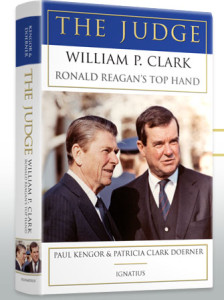Historic moments and turning points aren’t solely the result of those who are well known. Readers of this blog are well aware of my deep appreciation for Ronald Reagan and his reversal of America’s suicide attempt of the 1960s-1970s. Yet Reagan didn’t do this by himself. There were others devoted to the same causes who worked side-by-side with him. One of the most unheralded was William P. Clark, who, after Reagan appointed him to the California Supreme Court, ever after was known as The Judge.
 That’s the title of the book that admirably details the life and influence of Clark. Authors Paul Kengor and Patricia Clark Doerner trace the history of the Clark family from the first Clark settler of California to the man who would humbly wield influence behind the scenes at the White House. From the time Reagan was elected governor of California in 1966, Clark served practically as his alter ego. Associates would comment how the two men thought as one and perfectly complemented each other.
That’s the title of the book that admirably details the life and influence of Clark. Authors Paul Kengor and Patricia Clark Doerner trace the history of the Clark family from the first Clark settler of California to the man who would humbly wield influence behind the scenes at the White House. From the time Reagan was elected governor of California in 1966, Clark served practically as his alter ego. Associates would comment how the two men thought as one and perfectly complemented each other.
When Reagan took over the presidency in 1981, Clark came with him to Washington. He served first in the State Department because Reagan wanted “his man” there to keep things on track. In that post, Clark was able to navigate successfully the rapids often created by Secretary of State Al Haig.
After that tenure, Reagan brought Clark into the White House itself to be head of the National Security Council, arguably his greatest service to the president as he helped map the strategy to bring down the Soviet Union. The authors assert that, along with Reagan and Pope John Paul II, Clark has to be given a lion’s share of the credit for the success of that endeavor.
Once that strategy was well established, Reagan chose Clark to handle another tricky situation. He took over the reins of the Department of the Interior and brought calm and professionalism to an agency that had suffered turmoil in the first few years of the Reagan presidency.
In all these positions, Clark won not only the admiration of those who worked under him, but an enduring love and affection. He was the consummate professional who carried out his duties with love for God and others—and it showed. Clark’s Christian witness and his devotion to being whatever God wanted him to be guided his life.
The authors, in the final chapter, provide the ultimate praise for Clark when they write,
What would Bill Clark have become if he had never met Ronald Reagan? Clark says he probably would have proceeded happily as a “cow town lawyer” and a rancher, of course, “like the other Clarks.” Providence—the Divine Plan—had something else in store, however, and William Patrick Clark became, quite unintentionally, the most famous Clark of them all, and yet not as famous as he could have been, had he dedicated himself to his own self-promotion.
“You talk about a dark horse in history,” says former NSC aide Roger Robinson, “there may have never been a greater dark horse than Bill Clark. . . . He was the keyplayer, nearly the whole show regarding the Soviet takedown. [Clark] and his President were all about setting some three hundred million people free. And isn’t it poetic, isn’t it fitting, that this quiet rancher, this unassuming guy, gave everyone else the credit? He wanted no credit for himself. And then he just walked away.”
William P. Clark, unsung hero, left this life on August 10, 2013, to spend eternity with the Lord he loved. The Judge is a wonderful witness to a life well lived, with no regrets. It has my highest recommendation.
